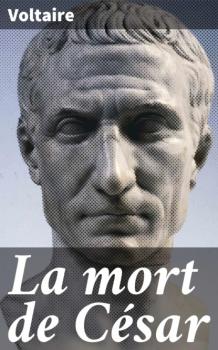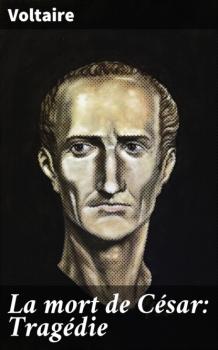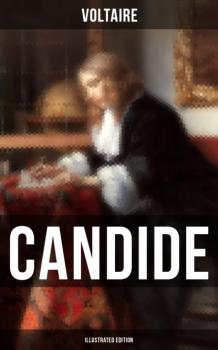Voltaire
Список книг автора VoltaireCandide
Ist die Welt, in der wir leben, tatsächlich, wie Leibniz behauptet, «die beste aller möglichen», oder ist sie ein Ort, aus dem Gott sich längst zurückgezogen, ja mehr noch, den er nie betreten hat? Am Beispiel des einfältigen Candide beantwortet Voltaires auf den Index gesetzte Romansatire diese Fragen mit der radikalen Demontage von Leibniz' philosophischem Optimismus, denn Candide erlebt auf seiner abenteuerlichen Reise die infernalischsten Schrecken und absurdesten Zufälle. Geläutert kommt er am Ende zu der Erkenntnis, dass dem Menschen letztlich nichts bleibt, als ,seinen Garten zu bestellen'.
La mort de César
"La mort de César", de Voltaire. Publié par Good Press. Good Press publie un large éventail d'ouvrages, où sont inclus tous les genres littéraires. Les choix éditoriaux des éditions Good Press ne se limitent pas aux grands classiques, à la fiction et à la non-fiction littéraire. Ils englobent également les trésors, oubliés ou à découvrir, de la littérature mondiale. Nous publions les livres qu'il faut avoir lu. Chaque ouvrage publié par Good Press a été édité et mis en forme avec soin, afin d'optimiser le confort de lecture, sur liseuse ou tablette. Notre mission est d'élaborer des e-books faciles à utiliser, accessibles au plus grand nombre, dans un format numérique de qualité supérieure.
La mort de César: Tragédie
"La mort de César: Tragédie", de Voltaire. Publié par Good Press. Good Press publie un large éventail d'ouvrages, où sont inclus tous les genres littéraires. Les choix éditoriaux des éditions Good Press ne se limitent pas aux grands classiques, à la fiction et à la non-fiction littéraire. Ils englobent également les trésors, oubliés ou à découvrir, de la littérature mondiale. Nous publions les livres qu'il faut avoir lu. Chaque ouvrage publié par Good Press a été édité et mis en forme avec soin, afin d'optimiser le confort de lecture, sur liseuse ou tablette. Notre mission est d'élaborer des e-books faciles à utiliser, accessibles au plus grand nombre, dans un format numérique de qualité supérieure.
CANDIDE (Illustrated Edition)
Candide is a French satire that begins with a young man who is living a sheltered life in an Edenic paradise and being indoctrinated with optimism by his mentor, Professor Pangloss. The work describes the abrupt cessation of this lifestyle, followed by Candide's slow, painful disillusionment as he witnesses and experiences great hardships in the world. The Novel is characterized by its sarcastic tone as well as by its erratic, fantastical and fast-moving plot. It parodies many adventure and romance clichés, the struggles of which are caricatured in a tone that is mordantly matter-of-fact. Still, the events discussed are often based on historical happenings, such as the Seven Years' War and the 1755 Lisbon earthquake. Voltaire concludes with Candide, if not rejecting optimism outright, advocating a deeply practical precept, «we must cultivate our garden», in lieu of the Leibnizian mantra of Pangloss, «all is for the best» in the «best of all possible worlds». This satire on Leibniz's philosophy of optimistic determinism remains the work for which Voltaire is best known.
François-Marie Arouet (1694-1778), known by his nom de plume Voltaire, was a French Enlightenment writer, historian, and philosopher famous for his wit, his attacks on the established Catholic Church, and his advocacy of freedom of religion, freedom of expression, and separation of church and state. As a satirical polemicist, he frequently made use of his works to criticize intolerance, religious dogma, and the French institutions of his day.
Über Toleranz
1762 wird in Toulouse der Kaufmann Jean Calas auf grausame Weise hingerichtet. Man beschuldigte ihn, seinen Sohn ermordet zu haben, weil der zum Katholizismus habe übertreten wollen. Ein klarer Justizmord. Voltaire nimmt den Fall auf und verfasst eine flammende Abhandlung gegen religiösen Fanatismus, ein Plädoyer für Toleranz. Diese hier neu übersetzte Abhandlung mit sämtlichen Anmerkungen Voltaires im Anhang ist einer der wichtigsten Texte der europäischen Aufklärung.
E-Book mit Seitenzählung der gedruckten Ausgabe: Buch und E-Book können parallel benutzt werden.
Letters on England
"Letters on England" by Voltaire. Published by Good Press. Good Press publishes a wide range of titles that encompasses every genre. From well-known classics & literary fiction and non-fiction to forgotten−or yet undiscovered gems−of world literature, we issue the books that need to be read. Each Good Press edition has been meticulously edited and formatted to boost readability for all e-readers and devices. Our goal is to produce eBooks that are user-friendly and accessible to everyone in a high-quality digital format.
The Age Of Louis XIV (Complete Edition)
This eBook edition of «The Age Of Louis XIV» has been formatted to the highest digital standards and adjusted for readability on all devices.
Voltaire had an enormous influence on the development of historiography through his demonstration of fresh new ways to look at the past. The Age of Louis XIV is one of his best-known histories. In this book, Voltaire is painting to posterity, not the actions of one man, Louis XIV, but more importantly the minds of men in the most enlightened age that ever was.
François-Marie Arouet (1694-1778), known by his nom de plume Voltaire, was a French Enlightenment writer, historian, and philosopher famous for his wit, his attacks on the established Catholic Church, and his advocacy of freedom of religion, freedom of expression, and separation of church and state. Voltaire was a versatile writer, producing works in almost every literary form, including plays, poems, novels, essays, and historical and scientific works. He was an outspoken advocate of several liberties, despite the risk this placed him in under the strict censorship laws of the time. As a satirical polemicist, he frequently made use of his works to criticize intolerance, religious dogma, and the French institutions of his day.
Philosophisches Taschenwörterbuch
Voltaire, der «geistreiche Spötter» – kaum ein Klischee über große Literaten ist so verbreitet. Doch das lässt den französischen Denker weit zu harmlos erscheinen. Geistreich und ironiebegabt war Voltaire gewiss, doch mild lächelnder Spott war seine Sache nicht. Er konnte scharf und ätzend sein, wo er sich engagierte. «Écrasez l'infâme» war sein Schlachtruf – «Zerschmettert alles Niederträchtige».
Das «Dictionnaire philosophique portatif», das 1764 erstmals erschien, ist alles andere als ein Nachschlagewerk. Es ist eine klare Abrechnung mit Dummheit, Fanatismus, Borniertheit und Intoleranz. In 73 Stichworten kann man lernen, was eine kritische, undogmatische Geisteshaltung ausmacht. Man kann von ihm lernen, was das Engagement eines Schriftstellers vermag. Und dass Engagement und literarische Qualität einander nicht ausschließen – eine kluge Kampfschrift, von der noch heute Impulse ausgehen können.
Der Literaturkritiker Denis Scheck bezeichnete es zu Recht als Skandal, dass das «Philosophische Taschenwörterbuch» nur in einer Auswahlausgabe auf Deutsch erhältlich sei. Diese Ausgabe macht die deutschsprachige Literaturwelt nun um einen Skandal ärmer.
Voltaire's Philosophical Dictionary
"Voltaire's Philosophical Dictionary" by Voltaire. Published by Good Press. Good Press publishes a wide range of titles that encompasses every genre. From well-known classics & literary fiction and non-fiction to forgotten−or yet undiscovered gems−of world literature, we issue the books that need to be read. Each Good Press edition has been meticulously edited and formatted to boost readability for all e-readers and devices. Our goal is to produce eBooks that are user-friendly and accessible to everyone in a high-quality digital format.









